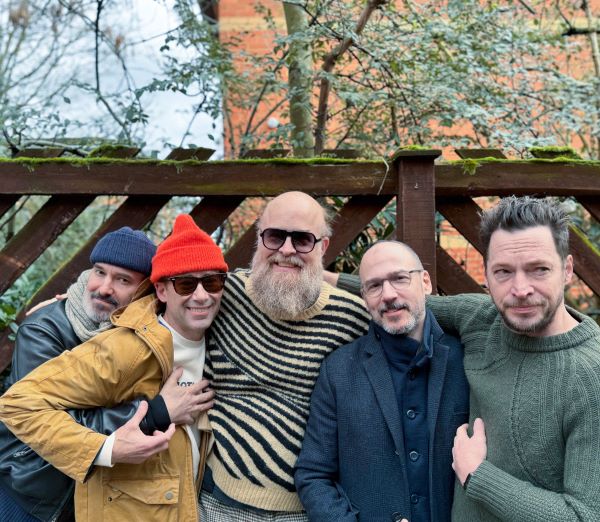
SOLD OUT!
The EARL'S 25th Anniversary Celebration
Night 1
Presented by:
Triple D's
Les Savy Fav

Les Savy Fav
Almost out of necessity, Les Savy Fav’s sixth LP was born in a pocket reality: singer Tim Harrington’s Brooklyn attic. “A freaky barn,” as he calls it, the room was built over the ruins of black mold and plywood, a de facto studio. Different from anywhere they’d ever recorded, the space allowed for a much-needed rebirth for the long-running post-hardcore band. In that inbetween, they pieced together what would become their latest evolution, OUI, LSF, growing the album’s title and cover art out of a patch of grass. “The record grew organically — literally and figuratively,” Harrington notes wryly. It’s impossible to talk about Les Savy Fav without acknowledging that it’s been more than 10 years since the guys released 2010’s Root for Ruin. But it’s not like they had a messy breakup or quit to become bankers. They just had a lot of living to do. “When we finished our last record, there was a sense that if we were going to do more, we wanted to do something more ambitious,” Harrington says. “I think it took us a while to even get in a space where that was possible.” Remember, these five men — Harrington, Seth Jabour, Syd Butler, Harrison Haynes, Andrew Reuland — have been friends and collaborators since 1995, when they attended Rhode Island School of Design. It takes a beat to shake old habits. In the interim, the band has been busy building growing their families, taking and losing jobs, and living through the various ecstatic and hideous aspects of growing older. Harrington wrote and illustrated children’s books (like 2015’s Noes to Toes You are Yummy), ran out of money, built his attic studio, wrestled with mental health issues, and got a job-job as a creative director. Butler continued to run his label, Frenchkiss (which released the majority of the band’s albums, including this one), and, along with Jabour, honed his writing skills as a member of Seth Meyers’ 8G band. Harrison left his career teaching to focus on fine art, while Reuland built a reputation as a film/commercial editor and writer on Adult Swim’s cult show Ballmastrz: 9009. That onslaught of personal ambitions and adulting could spell death for many bands, but, as Harrington puts it: “The band was never a job, so we can’t get fired and don’t have to quit. We had the time to figure out how to bring the people we’ve become and the people we are as artists together authentically. There’s a chaotic, untethered ecstasy at the center of the band’s universe. Squaring that with the desire to create stability and the need to endure some grind isn’t easy.” Over the years, the band has continued to perform, always on their own terms, but after a stint at Primavera in 2022, they caught the proverbial songwriting bug once more, sharing demos, jamming in Harrington’s attic, and recording through the heap of DIY and esoteric gear Harrington collected over the last decade. At first, there was no intention of recording an album; they were playing music, not writing it. “The last record was a lot about holding on. OUI, LSF is the sound of release — no map, no preconceptions, no self-righteous certainty,” Butler says. “There's nothing like hitting 50 to slap the cocksure vanity off your face.” That’s not to say it was easy. The challenge of learning a new way to write and work together took a lot of letting go. Among the artwork that plasters the attic studio is a piece by Harrington that reads, “Can’t do it how you want. Don’t want to do it how you can,” spiraling into a bloodshot eye. “I put it there as a warning about how easily that fixation can paralyze you,” he says. The resulting album is a glorious mix of tragedy and comedy — studded with nods to the band’s eclectic musical taste — delightfully weird and utterly them. Album opener “Guzzle Blood” crashes us into the record like a runaway cop car, setting the tone for the rest of the 14-song suite. “It opens with just a total disillusion — a loss of faith, frustration, anguish,” Harrington says of the song, which speaks of demons haunting your sleep and the battle for salvation. “Limo Scene” whiplashes in next, a peppy, lean “sex-ghost song,” as Harrington calls it, channeling the Rivingtons’ “Para Oom Mow Mow.” And then there’s “Void Moon,” named after an astrological period where it’s apparently super dangerous to make decisions. Too bad the couple in this growling rocker decided to get married during this doomed time. Harrington says, “The song is like: What if Edgar Allen Poe was into astrology?” “Mischief Night” is named after what people in Jabour and Harrington’s home state of New Jersey call the night before Halloween — when folks smash pumpkins and egg cars — inspired by an equally debauched night in Tijuana after a 2002 gig at iconic San Diego venue the Casbah. The spine of the song started as a slow dirge from Jabour — Harrington just doubled the speed until the guys found a bone-rattling Bonnie and Clyde crime banger inside. After this haunting introduction to OUI, LSF the band delivers a sharp bite of bratty candy with “What We Don’t Want” — a screed against “the algorithm” that dominates contemporary society. “It’s not not self-righteous, but the back half challenges glamorizing or romanticizing the old times before you got what you want, whenever you wanted it,” Harrington says. “Legendary Tippers” swans in next on a wave of toe-tapping swarm. “It’s got a Laissez-faire swagger that probably would've caused us to outsmart ourselves in in the past,” Harrington says. “The guitars are literally a stack of scratch tracks we decided sounded great without edits. To me, it sounds like the solo from ‘Taxman’ wolfed down a bottle of Adderall,” he adds. “Dawn Patrol” is pure sepia-toned nostalgia, a chorus of crickets that long-time mixer Chris Zane says sounds like the Nineties in Connecticut. It’s the feeling of falling asleep in the backyard as a party rages inside. And then there’s the cheekily titled “Somebody Needs a Hug,” an airy song that belies the sadness at its core. “I wanted it to be a celebration of feeling good without being naive,” Harrington says. “When I sing, ‘I’m having fun right now,’ it’s about the visceral joy I have on stage performing, how fleeting it can be and how there’s something profound in embracing its simplicity.” “Racing Bees,” recorded on an iPhone, is a bit of a palette cleanser, an onomatopoeia of a track that Harrington says was an experiment in simplicity. “A song doesn’t have to be labored over to qualify as a song,” he says. From there, the frontman gets raw on the unexpectedly intimate ballad “Don’t Mind Me,” trying out his piano bar croon as he sings about a world and a love lost. “I remember playing it for the guys almost as a curio and getting a strong response from everybody,” he says. “I'm a little embarrassed about it. It's a very vulnerable song. I'm not scared to pull all my clothes off and fall down from stage rigging; I'm much more scared of sharing that song.” Harrington and the guys don’t let things languish, though, following up this sad, simple track with the goofily titled “Oi Divison,” complete with unlikely doo-wop vocals in the chorus, and an even less likely nod to the B-52’s “Roam.” The acerbic “Barbs” follows, an Eighties-esque banger that includes the oh-so memorable image: “Loving you is like getting fucked by a cat/at first it’s fun/then the hard part comes.” “Nihilists Cry Less,” zooms in next, answering the question: What would it sound like if a Beck song turned into a Spiritualized song midway through? When Harrington first gave the lyrics to Reuland, the guitarist wove in a distinctly Western sensibility — paired with “pots and pans” drum loops and some virtuosic bass playing by Butler — that builds to a swelling, swirling symphony. If you’ve ever heard the band’s obscure Accidental Deaths 7-inch, you’ll immediately recognize its place in the Extended Savy Universe — a counterpoint to “Legendary Tippers” and a dig at Harrington’s younger self. “When I was a kid, the nihilist posture was kind of cool,” he says. “Unfortunately, now nihilism has infected the entire world. The conservative movement in America is essentially a selfdestructive fantasy nihilism disaster.” And, finally, there’s “World Got Great,” a rocker that feels like it’s falling apart at the seams — in a good way. A bookend of faith to the disillusionment of album opener “Guzzle Blood,” it basically sums up where the band is today and where it hopes to go. “I’ve always felt like a late bloomer,” Harrington says before quoting the song, “What luck not to bloom sooner.” A decade may have passed, but Les Savy Fav is still growing — like their musical range, like the seeds that grew into their album art, like the hope that someday they can say: “We were there when the world got great, we helped to make it that way!” Here’s to 10 more years.

Ultra Lights

